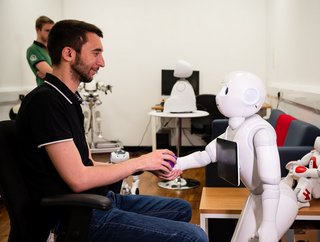UK robot research builds on Alan Turing’s codebreaker legacy

The University of Manchester has opened a specialist multi-disciplinary centre to explore developments in smart robotics, artificial intelligence (AI) and autonomous machinery.
The Manchester Centre for Robotics and AI will be based at the engineering and materials facilities at The University of Manchester and will provide a state-of-the-art home for industry-leading research in AI-powered devices and be an “interface between robotics, autonomy and AI”.
The University of Manchester’s Centre for Robotics and AI will design control systems with a focus on biomimetic sensors, actuators and robot platforms; develop new software engineering and AI methodologies for verification in autonomous systems to develop trust; research human-robot interaction, with a focus on the use of brain-inspired approaches to robot control; and research the ethics and human-centred robotics issues.
The University has built a reputation of excellence in AI and robotics, partly based on the legacy of seminal thought leadership begun in this field in Manchester by legendary codebreaker Alan Turing. To mark the opening of the new robotics centre, the Manchester group hosted its first conference on Wednesday this week. Topics under discussion included applications of robotics in extreme environments.
Robot takes on world’s deepest nuclear clean-up site
For the past decade, a specialist Manchester team led by Professor Barry Lennox has designed robots to work safely in decommissioning nuclear sites in the UK. A ground-breaking robot called Lyra developed by Professor Lennox’s team - and recently deployed at the Dounreay site in Scotland, the “world’s deepest nuclear clean-up site” – has been listed in Time Magazine’s Top 200 innovations of 2022.
A conference highlight was a joint talk by robotics expert Dr Andy Weightman and theologian Dr Scott Midson spotlighting ‘posthumanism’ – a future world where humans won’t be the only highly intelligent decision-makers.
Dr Weightman researches home-based rehabilitation robotics for people with neurological impairment, and Dr Midson researches theological and philosophical critiques of posthumanism, which can help with the special challenges of rehabilitation robotics.
Angelo Cangelosi, Professor of Machine Learning and Robotics at Manchester, says the University offers a world-leading position in the field of autonomous systems – a technology that will be an integral part of our future world.
Professor Cangelosi, co-Director of the Manchester Centre for Robotics and AI, says: “Our research and innovation team are at the interface between robotics, autonomy and AI – and their knowledge is drawn from across the University's disciplines, including biological and medical sciences – as well the humanities and even theology.
“This rich diversity offers Manchester a distinctive approach to designing robots and autonomous systems for real-world applications, especially when combined with our novel use of AI-based knowledge.”
- Robots and drones demanding data for life-or-death decisionsTechnology
- “Augmented workforce” still finding its feet in shift to AIAI Strategy
- Machine learning hashes out a way to speed up huge databasesMachine Learning
- Scientists reflect on the Harry Potter nature of AI chatbotsAI Applications






